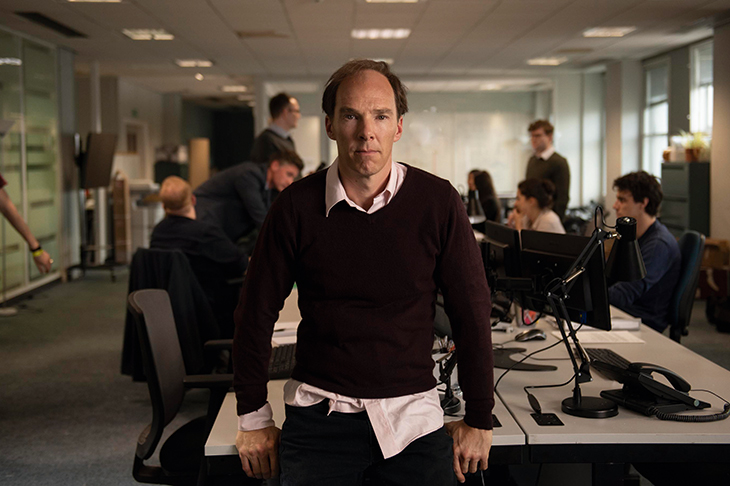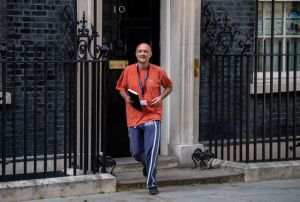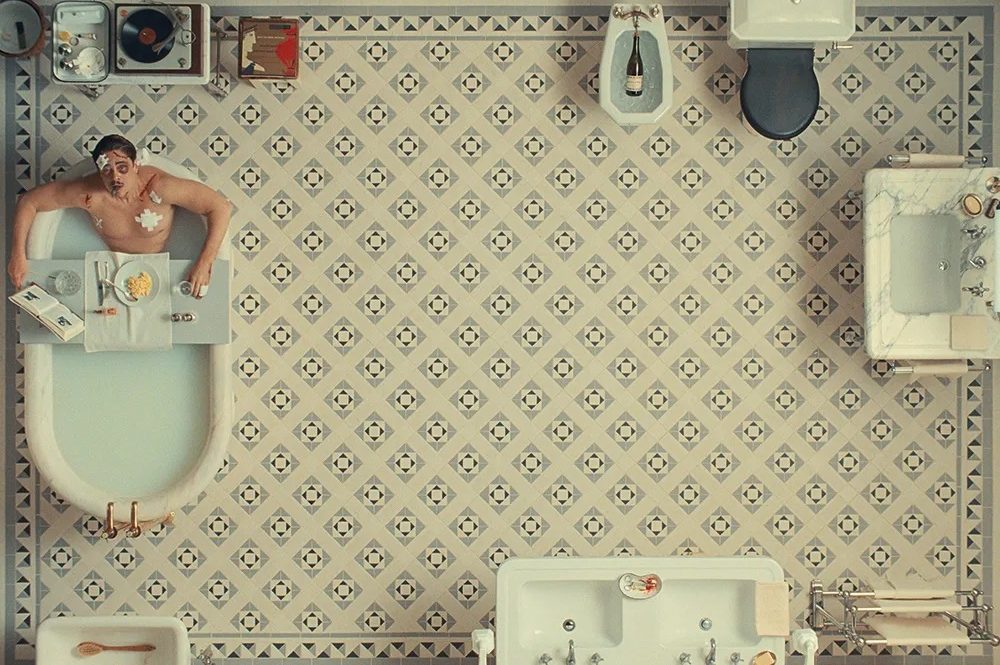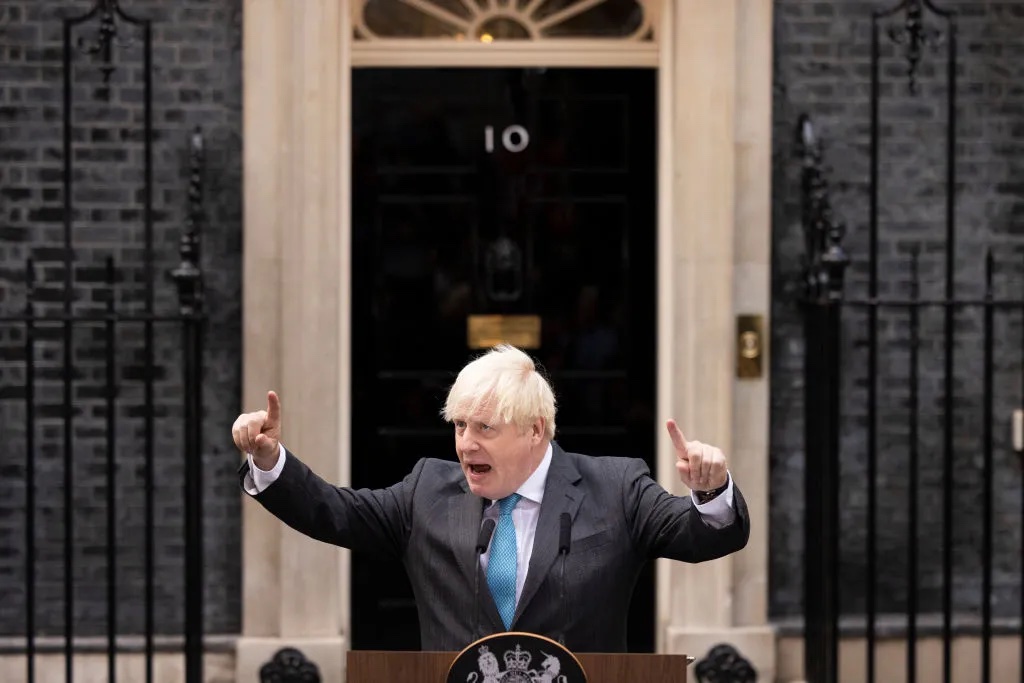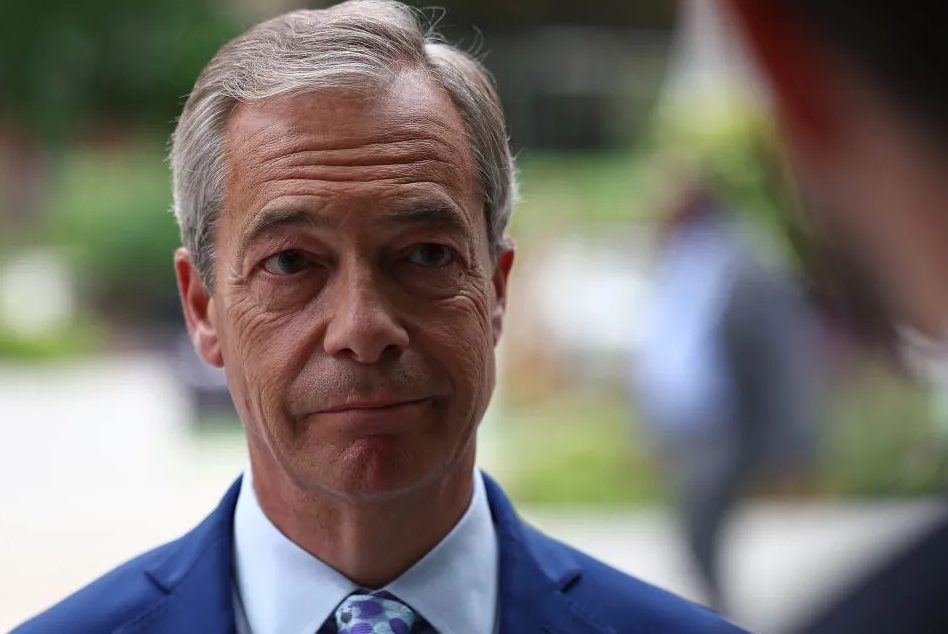Imagine looking at a photo of a stranger and feeling in response, quite naturally, the sort of happy affection you might feel towards a spouse. Well, it’s weird. In July this year, when Benedict Cumberbatch was filming Channel 4’s upcoming Brexit film (Brexit: The Uncivil War) a friend sent me some photos by text message, tabloid snaps from the set. Benedict plays my husband Dominic Cummings, director of the Leave campaign, and the shots were long-lens and hazy: Ben/Dom pushing his son on a swing; Ben/Dom kissing his wife.
The real son-of-Dom and I were halfway through our Rice Krispies when the photos came through and I remember how taken aback I was. It’s not that they look alike. ‘We have different shaped heads,’ Cumberbatch tells me later. ‘Dom’s taller than me, I think, and he’s got a more prominent jaw. A bit of an underbite.’
But the stance, the set of the head and hands, the posture, were all perfect. ‘Who’s that?’ I said to my two-year-old, handing him the phone. He looked back at me as if I were mad: ‘Dada. That’s Dada, Mum.’
I haven’t seen the movie yet. I expect there’ll be a great fuss over details of the plot. There are those whose sanity depends on thinking Russians and robots fixed the referendum and that Dom’s intrinsically evil. I’ll be thinking: how can one man simply transform into another? Why and how can humans do this? And: I just never expected this after Benedict came round for dinner.
The visit was back in early June when the evenings were long and warm and the cabinet had not yet betrayed their promises to respect the referendum. Dom’s terrible at passing on information. (‘Might come round — think he’s vegan.’) So I wasn’t really expecting Benedict Cumberbatch to turn up at ours. It seemed too surreal a prospect. Nonetheless, I set the scene: flowers; vegan pie. All I knew about Cumberbatch politically was that he’d campaigned for Remain. I assumed, I’m afraid, that he had taken the part of Dom for the same reasons Ralph Fiennes took on Voldemort, or Christopher Lee, Dracula.
He arrived at the door, slight, polite and oddly familiar in the way famous people are. I led him downstairs into our kitchen, into the happy scene I’d laid on for him and quickly realized my mistake. He was friendly, curious — but he hadn’t come to judge Dom. The script was done and dusted. He’d come to become him.
‘I took the role because of the script,’ Cumberbatch tells me now. He’s not doing press for the Brexit movie, but he kindly agreed to talk to me about the strange business of transforming into someone else.
‘I’ve been a big fan of James Graham from This House onwards and I thought how extraordinary that I’m reading a script that reads like a thriller when I know the outcome. I’m being sucked into it — these characters, their intelligence, the wit of it, the emotional power of the drama. I realized this is what drama can do at its best.’
It was an unexpected outcome for many people as well, wasn’t it?
‘At the time you don’t have foresight to understand the significance of these events. They just happen, then lo and behold. The campaign was the most extraordinary story — one of the most extraordinary stories in all the history of politics. It really encapsulated that for me. It’s a hell of a role playing your husband!’
It was a hell of a thing watching Benedict Cumberbatch prepare to play my husband. He sat down opposite Dom at about 8:30 p.m. that summer evening in what I imagine is a very Cumberbatchian pose: legs folded beneath him, alert, leaning forward, head up. ‘Just water please, I don’t really drink.’ By 10:30 he was leaning back, just like Dom, glass of red in hand. By 1 a.m. he was a mirror image of his subject. It was a Rorschach blot of a scene. Both men reclining, each with an arm behind their head.
‘I noticed the way Dom holds his hand over his head,’ Cumberbatch says. ‘The way he strokes his head a lot. And he rests the crook of his elbow at the top of his skull. He opines strongly, but he listens deeply too. What else? That soft “R”. I don’t know if it’s Durham or something specific to Dom. He’s got a different shape jaw to me, so the accent wasn’t easy.’
So your actual mouth shape affects the accent? ‘It absolutely does, yes. It would be very hard for me to maintain that accent without some sort of surgery, and I don’t think I’d go that far!’ He laughs.
When I left them there in the kitchen in the early hours of the morning, Cumberbatch was genuinely trying to understand Dom’s view of Brexit. How do you begin to get into a character with very different ideas to your own? ‘To start with you lean in — you have a natural empathy, I think. I am not saying this just for you, but for me I feel a natural empathy towards the character I played and I liked the idea of trying to inhabit part of their lives, intellectually and also physically as well. I enjoy that process of transformation and chipping away from myself into a person’s outlook.’
And what about the uncanny business of inhabiting Dom physically? He looks so like him in the trailer. His mannerisms are so perfect that it’s hard not to imagine he’s having Dom-ish thoughts. Does adopting someone’s posture help you think like them?
‘That’s it, yes. I think posture affects every-thing from heartbeat to intake of breath to the way you think.”
And…why do it at all? There’s no real need for such a spooky likeness, is there — given that the character transcends the reality and becomes its own thing? Why is it important to get it so right?
‘That’s a very good question. I think you kind of have a responsibility. People know more about the politicians that were in the public eye during that campaign, rather than those on the other side like Craig Oliver and Dom. It does feel like a responsibility to get him right.’
Did anything surprise him about Dom?
‘Well he’s got a very even keel about him…and yet he has a sense of humor and he can laugh at himself and other things. He’s not a sociopath.’ After some of the things I’ve read about Dom, that’s a relief.
The last time I talked to an actor about acting was a decade ago, but I’ve thought about it ever since. Dame Eileen Atkins explained to me that sometimes on stage you simply disappear into a character. She said (of theater acting): ‘On rare nights, when the mood is right, you have this almost out-of-body experience. It’s almost indescribable, but it’s as if the character you’ve created in your mind and rehearsed actually takes over.’ Does that happen to Cumberbatch too?
‘There are moments like that. There is the flow, you know. You are kind of not in the past or the future; you’re in the present, it’s just sort of happening. You try and aim for one of these takes, but if you’re on a film set you might feel like that, but then it might not be right technically.’
That sounds annoying, I say. It’s a measure of the man that Cumberbatch instantly sees the situation from the perspective of other people on set.
‘Well, yes, but it’s annoying for a camera-man who has just got everything right for that take when you say, no, I think I got that inflection wrong, I should have been looking at that line and, oh God, I said Remain instead of Leave!’
‘And sometimes,’ he says, ‘it’s less about the flow and more like patting my head whilst rubbing my stomach. A bit like when I’m in Sherlock and I’m playing the violin. I mean I don’t even know how violinists can hold it — it takes a lifetime to learn. Every time I listen back it is just mortifying. And in the Brexit film there’s a scene when I’m writing on a big glass wall and I’m doing pie charts of demographics — there is one of the clips in it where I’m talking about Remainers whilst writing ‘In’ or ‘Out’. I think it was when they are talking about Remain and Leave and things like that. On top of which I have to hit the lines, I have to hit the mark every time I move, I have to respond to my fellow colleagues and rattle off this dialogue. I have to focus on the writing being legible and at the same time give it a dynamism… but at the same time be accurate. It’s hard, then, not to be outside the take. It’s hard to be in the moment.’
And were there moments when he felt his Dom character taking over, when he felt the flow was there? ‘In the broom cupboard, when he is sort of the brain within the brain of the operations.’
The morning after our night with Benedict Cumberbatch, Dom said he’d had great fun talking to his alter ego. However the film turned out, he said he didn’t know many MPs who were as well-informed and pleasant.
When I spoke to Cumberbatch last week, we didn’t talk about the rights and wrongs of Brexit. I’m tired to my bones of the EU row. It’s like a pointless game of cards: you play your picture of a co-operative, civilized EU; I play my picture of a dystopian future. You play your picture of an angry racist Leaver; I play mine of a corrupt MEP claiming expenses no one ever checks.
But it seems to me a beacon of hope that someone who believes in the EU is willing to inhabit the skin of someone who doesn’t. That’s sort of what we all need to do right now, isn’t it? I ask Cumberbatch.
‘Well possibly,’ he says. ‘I am very wary of coming across as being wordy or preachy, but it’s really about listening to each other, all of us. And to inhabit someone else’s point of view is part of the way of going towards that.’
This article was originally published in The Spectator magazine.



